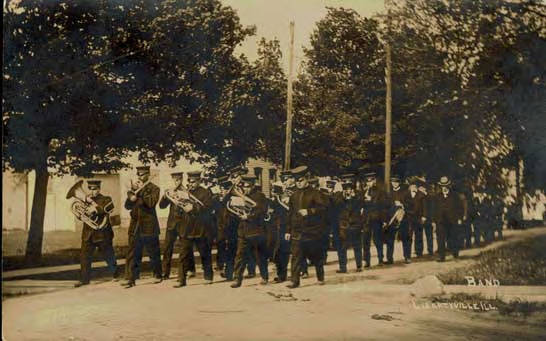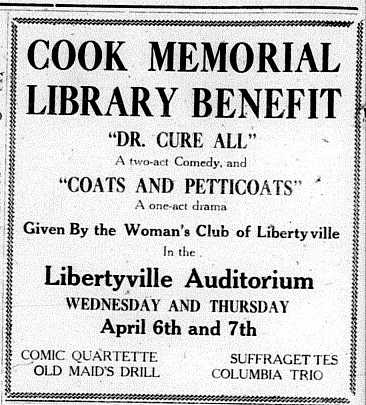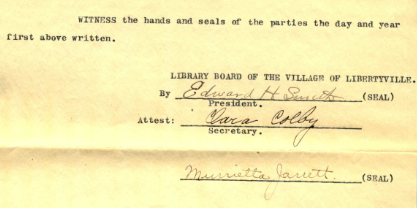
Memorial Library, circa 1923
Cook Memorial Public Library collection
From a collection of books in the homes of members of the Alpha Club in 1909, to a subscription library on a drugstore’s shelves, to a room in the village hall….the Libertyville public library would finally find a home in the former Cook residence after the death of Emily Barrows Cook in 1919.
At the time of the 25th anniversary of the library, in 1946, Mabel MacGuffin wrote a letter to Grace Gridley, who was a member of the library board at that time. Mabel’s letter explained how the Cook house became the library. Mabel was in a unique position to know the facts, given that she was a member of the library committee of the Alpha Club/Libertyville Women’s Club as well as a member of the first Cook Library Board, and her younger sister Norma played an integral part in the transformation.
According to Mabel, her sister Norma Peck attended the University of Illinois Library School in the mid-1910s. One of Norma’s projects was to make a survey of library needs of any given community. Mabel wrote, “We had our little [Alpha Club] library at that time so she surveyed Libertyville.” Mabel took her sister’s suggestions to Tamson Monroe, Emily’s sister, and Mabel “easily persuaded [Tamson] of its feasibility and pointed out the advantages and honor to family. [Tamson] in turn presented ideas to Mrs. Cook who consented and provided in her will that home be utilized as library, grounds be made into a public park and rest of property sold for maintenance and building funds.” [1] Upon Mrs. Cook’s death all of these plans were set into motion.
In 1920 the library run by the Libertyville Women’s Club (formerly the Alpha Club) was still located in the village hall. It continued to be the de facto public library for Libertyville for almost a year after Emily Cook’s death. In 1920 and ’21, many details still needed to be worked out concerning the property and the organization of the library before its doors could open.

At the August 2, 1920 meeting of the Libertyville village board, Mr. Charles VerNooy presented the board with the deed to the Cook home and property. The property that the Cooks left to the village included not only the lot on which their home stood, but also lots behind the house and lots on West Cook Street back to Butler Lake [2]. The 1902 map below shows the subdivided lots in the property, some of which had already been built upon.


Once the village of Libertyville owned the Cook property, the next step was to work out how to operate and fund a library. The funding came first. The village board set an election date for November 5, 1920, “for the purpose of voting upon the proposition to levy an annual tax…for the establishment and maintenance of a free, public, library.” [3]
The village declared a “half holiday” on the day before the election to dedicate the park and Cook house. The dedication was full of music and speeches. The high school and grammar school bands paraded around Cook Park. The program included a community sing. Many official people made remarks, and the Honorable George Edmund Foss, former U.S. Representative from Illinois, gave the dedication address. The festivities ended with music from the Libertyville Band [4].

Image courtesy of Libertyville-Mundelein Historical Society
After the dedication and the election had taken place, the newspaper printed an official declaration from the village board on November 18, announcing the transfer of responsibility for the library collection in the village hall from the Libertyville Women’s Club to the Village of Libertyville: “The board of trustees of the village of Libertyville wishes it to be known that the board is now maintaining the public library….From now on the library privileges will be free.” [5].

Although the village had passed a levy to fund the library and the park, those funds did not become available for use until 1922 [6]. To fill in this gap, the village organized a Library Finance Committee “for the purposes of raising funds for the support of the Libertyville public library.” [7] The committee was made up of heads of community groups such as church societies, schools, lodges, clubs, bands, and the village board. According to local newspaper reports, the first three groups to donate were the Libertyville Women’s Club, the Modern Woodman lodge, and the Royal Neighbors of America Society. In the newspaper, the Library Finance Committee appealed to Libertyville’s community spirit: “This is your library…Everyone should give something, no matter how small. Get in line and be among the first to help with an institution needed by all.” [8]
And help they did, with all kinds of money-making events. The American Legion sponsored a dance and the Women’s Club sold lunch and candy [9]. Plays and theater shows yielded big results. And individuals and businesses gave too. From the banks who gave $100 to individuals like Edwin Austin who contributed $5, everyone chipped in [10].





Meanwhile, the village needed a library board to devise and carry out concrete plans get the library ready to open. On April 19, 1921 the village held an election to elect a library board. Tamson Monroe, Emily Cook’s sister who had been so influential in convincing Emily to leave her property to the village for a library and a park, provided the slate of names for the library board. All six were duly elected. The members of the first library board, and their terms of service, were: Mrs. Augusta Lovell and Mr. Benjamin Miller (1 year each), Mrs. Mabel MacGuffin and Dr. Charles Galloway (2 years each), and Mrs. Clara Colby and Dr. Edward Smith (3 years each). Once elected the board wasted no time; they held their first meeting in Mr. Miller’s business office the very next day [11].

April 13, 1921, p. 2
Try to imagine all the details that needed to be addressed by that first library board, from turning a house into a library, to hiring a librarian to deciding what the hours and loan periods would be.

of the Village of Libertyville
The new library board began by electing officers (Dr. Smith as president and Mrs. Colby as secretary) and subsequently created committees to divide up the work. The following months were quite productive. The board wrote rules and by-laws. They fixed up the main floor of the house with library fittings such as shelve and noise muffling cork flooring. They converted the upstairs into living quarters for the librarian. They made plans to stucco the outside of the building and put on a porch with columns. Between the fundraising and the library board’s work, it was a busy summer.
Of course the board also hired a librarian. They chose Mrs. Murietta Jarrett, whose husband worked for Keystone Printing Company in town. Her contract with the village gave her the responsibilities of keeping the library open for 20 hours a week. She also agreed to “become proficient as to the duties of librarian…. to take a general interest in the library work…to do the sweeping and dusting in said library rooms, and on the porches….provide the janitor work necessary for taking care of the furnace in said building…” which included “carrying out from said building of the ashes from said furnace, and such other work as is usually done by janitors in libraries.” [12]

Finally, the day arrived. The Ansel B. and Emily Barrows Cook Memorial Library opened its doors to the public for the very first time on Saturday, October 22, 1921, to surprisingly little fanfare in the press or even in the minutes of the library board [13].

Now Libertyville had its own stand-alone public library building. Mrs. Jarrett bought books and accepted donations to grow the library’s collection. Early on she hired young Marjory Decker as a “very efficient” assistant [14]. And in addition to buying books, the library purchased a typewriter and a newspaper rack.
As with any new organization, the library experienced some growing pains in its early years. Mrs. Jarrett, having gotten the library off to a solid start, resigned at the end of 1922. The board considered applications for a new librarian and hired Mrs. Blanche Mitchell, who served the library until her death in 1951. The rest of the 1920s would bring more adjustments as the Cook Memorial Library settled into its building and its community.
Endnotes
1. Mabel MacGuffin to Grace Gridley, May 28, 1946, Local History Collection of Cook Memorial Public Library District.
2. Libertyville Independent, August 5, 1920, p. 1.
3. Libertyville Independent, October 21, 1920, p. 8.
4. Libertyville Independent, October 28, 1920, p. 1
5. Libertyville Independent, November 18, 1920, p. 1.
6. Libertyville Independent, January 13, 1921, p. 5.
7. Ibid.
8. Ibid.
9. Libertyville Independent, February 17, 1921, p., 4.
10.Libertyville Independent, August 25, 1921, p. 4.
11. Minutes of the Cook Memorial Library Board of the Villaertyge of Libertyville, April 20, 1921, Local history Collection of Cook Memorial Pubic Library District.
12. Contract between the Library Board of the Village of Libertyville and Murietta Jarrett, Local History Collection of Cook Memorial Public Library District.
13. Minutes of the Cook Memorial Library Board of the Village of Libertyville, November 1, 1921, Local History Collection of Cook Memorial Public Library District.
14. Minutes of the Cook Memorial Library Board of the Village of Libertyville, March 13, 1922, Local History Collection of Cook Memorial Public Library District.
Categories: Local History
Tags: Local History
